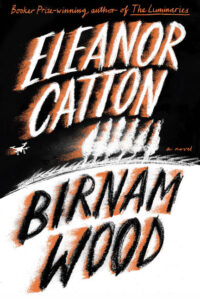April 17, 2023
Birnam Wood, by Eleanor Catton
True confession time: I’ve never read Eleanor Catton’s Man Booker Prize-winning novel The Luminaries, and I likely never will. Reportedly, it’s very lengthy, set a long time ago, and all about a man staking his claim in a gold rush (yawn), and no doubt it’s extraordinary and brilliant, but each of these makes for three counts on my NOPE NOPE NOPE list, and there are so many other books in the world.
My interest in Catton’s latest Birnam Wood, however, was piqued by critic Lauren Leblanc’s enthusiasm for the project, which was also the reason I went to see Catton at the Toronto Public Library’s Bluma Salon event in early March, which was really fantastic, and I bought the book there. She kept talking about plot, and about how “character is action; we are what we do,” and I was intrigued, though I’ve got to say that even though this novel clocks in at only just over 400 pages, I picked it up thinking of a doorstop, and what have I gotten myself into? There was not a lot of white space. Will I be reading this novel for the next 900 years?
But reader, I sped through it in two days. This book! This book! Speaking of plot… Though it didn’t take off immediately. I was interested in the story and surprised to find that it was so much more intimate and immediate than I was expecting, deeply embedded in the experiences of characters ranging from the leader of the gardening collective, her loyal sidekick, a renegade citizen journalist, a pest-control mogul who has recently received a knighthood, his wife, and a reclusive American billionaire seeking refuge in middle of nowhere New Zealand for reasons that aren’t bound to be honourable. I thought this would be a more sprawling book, individual people at a distance, more a book in general than this one, which is so exactly, specific. Even though the paragraph-long sentences were hard to parse at first, so many clauses, and semi-colons. Like making one’s way through the weeds and the bramble, and then suddenly there I was at the heart of things and the novel was unputdownable.
“She was still looking for a villain. She was still trying, desperately—and uselessly—to find somebody more monstrous and despicable than her.”
Who is the villain of this story? Who is the hero? Such murky distinctions (if any are to be made) are what make Birnam Wood such a fascinating puzzle of a story. I loved it.






